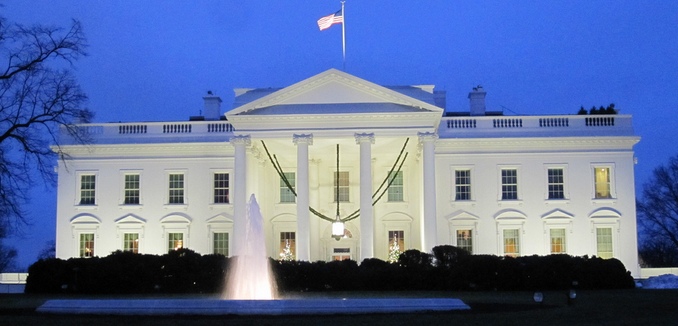The Trump administration told Congress on Monday that while Iran has met the conditions necessary to be recertified as complying with the terms of the 2015 nuclear deal, it is violating “the spirit” of the pact through its destabilizing behavior across the Middle East.
President Donald Trump, Secretary of State Rex Tillerson and “the entire administration judge that Iran is unquestionably in default of the spirit” of the agreement, one official told the Associated Press.
Administration officials announced that they would enforce the deal more strictly, impose sanctions on Iran for its terror support and other aggression, and engage European allies in applying more pressure on Iran. On Tuesday, the Treasury Department imposed fresh sanctions on 18 entities and individuals who are involved in Iran’s ballistic missile program and support its malign behavior across the Middle East.
In a meeting with his national security team—including Tillerson, National Security Adviser Lt. Gen. H. R. McMaster, Defense Secretary Jim Mattis, and chairman of the Joint Chiefs of Staff Gen. Joseph F. Dunford Jr.—the president had insisted on such measures before agreeing to recertify. Trump is reportedly “frustrated” with the deal and told his top aides that he would not continue recertifying it indefinitely, The New York Times reported.
In an interview with the National Interest on Monday, Iranian Foreign Minister Mohammad Javad Zarif warned that Iran could allege that the United States is violating the deal and stop complying with its terms. “If it comes to a major violation, or what in the terms of the nuclear deal is called significant nonperformance,” Zarif told the journal’s editor Jacob Heilbrunn, “then Iran has other options available, including withdrawing from the deal.”
Mark Dubowitz, executive director of the Foundation for Defense of Democracies, observed two years ago that the language of the deal gives Iran leverage to leave or threaten to leave it. The deal explicitly notes, “Iran has stated that if sanctions are reinstated in whole or in part, Iran will treat that as grounds to cease performing its commitments under this JCPOA in whole or in part.” While the accord was only meant to govern Iran’s nuclear program, its language appears to allow Iran to back out even in response to the imposition of non-nuclear sanctions.
White House officials indicated Monday “that the administration considered Iran to be in breach of the spirit, if not the letter, of the nuclear agreement because, they say, the bargain’s purpose was to enhance regional stability,” Eli Lake reported for Bloomberg View.
The administration’s skepticism towards the deal could impact businesses seeking to engage with Iran, Lake wrote:
All of this is also a lesson to Western businesses hoping Iran will be a safe place to invest in the aftermath of the nuclear bargain. Administration officials on Monday said the Treasury Department was still reviewing a proposed sale of civilian airliners from Boeing to Iran’s largest airline. That deal is under scrutiny because Iran uses its civilian air fleet to send supplies, personnel and weapons to the war in Syria.
In his interview with the National Interest, Zarif objected to how long it took the Obama administration to grant permits for Airbus and Boeing to sell aircraft to Iran, even though the nuclear deal does not obligate the U.S. to allow such deals.
Critics of the Boeing deal have pointed out that Iran regularly uses civilian airlines, including state-owned Iran Air, to ferry weapons and troops to Syria in defense of the regime of Bashar al-Assad, which has been implicated in widespread war crimes. Iran Air flew known weapons resupply routes to Syria three times in June, while a Western intelligence report seen by Reuters in 2012 noted that Iran continued using civilian aircraft to transport large amounts of arms and personnel to the war-torn country.
Iran’s involvement in Syria has led one observer to note that it is “treating Syria like its 15th province,” keeping tens of thousands of allied Shiite troops deployed there.
Iran’s increased influence and aggression since the announcement of the nuclear deal have also been on display in other parts of the Middle East, including Iraq, Yemen, and Lebanon. It also has repeatedly tested ballistic missiles capable of carrying nuclear payloads in defiance of UN Security Council Resolution 2231, which implemented the nuclear accord.
Iran has also continued imprisoning Westerners on dubious charges, a practice critics say grants Iran leverage in negotiations with foreign governments. This week, Iran’s judiciary announced that a Chinese-American student who was conducting doctoral research in Iran was sentenced to 10 years in prison for “infiltrating” the country and transmitting “sensitive” information abroad.
[Photo: Flickr ]




